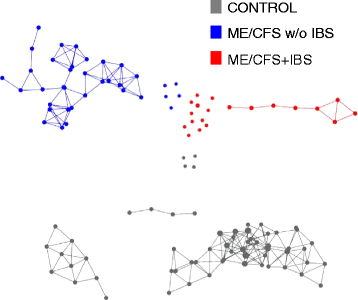I'm curious, does Lipkin write about SIBO in this or another study? I agree you can't get anywhere without addressing that if you have it, it just makes disease management impossible, but to what degree is the small intestine in CFS/ME deranged as opposed to standalone SIBO? I guess I would like to see study like this comparing CFS/ME+SIBO to CFS/ME and SIBO instead of IBS.I spent years trying to get up to a therapeutic dose of antibiotic herbs and I couldn't because the bacteria that was being killed off (die-off), in my gut, caused flares in my symptoms that I could not tolerate. I believe the die-off is from the lipopolysaccharides (LPS) in the cell walls of gram negative bacteria in my gut, being killed off and the LPS pass through an over-permeable gut (leaky gut).
It took me 4 months to get up to a very small dose of antibiotic herbs, with a lot of die off along the way. I then took a 10 day course of Rifaximin at 1200mg a day and was able to go up to 15-20 times the dose of antibiotic herbs, in just a month or so, with very little die off or symptom flares. So the connection of symptoms and high dysbiotic gut bacteria, for me, is clear.
Rifaximin only works in the small intestine and is not absorbed into the blood stream. So the improvements I made were from lowing the bacterial overgrowth in my small intestine.
These interventions have greatly improved my level of physical functioning and my well being, profoundly, along with a starch free diet and high dose probiotics. I haven't felt this good in many years. I am certain my symptoms are directly connected to the level of dysbiotic bacteria in my gut.
If I want to worsen my symptoms, all I have to do is take too high a dose of berberine, oil of oregano etc. A high enough dose would put me in bed I'd be suffering so much and I rarely even take naps now. I firmly believe that Lipkin, Hornig, Chris Armstrong and others will, in time, show that the gut is the core issue.
(I do the same nowadays, avoiding starch and fiber and I mostly sip orange juice all day +select fibers... I would rather not get too many flavonoids but I'll forcefully get tons of hesperidin this way and it happens to curtail LPS in bunch of studies http://www.tandfonline.com/doi/pdf/10.1080/08923973.2016.1214142 )

